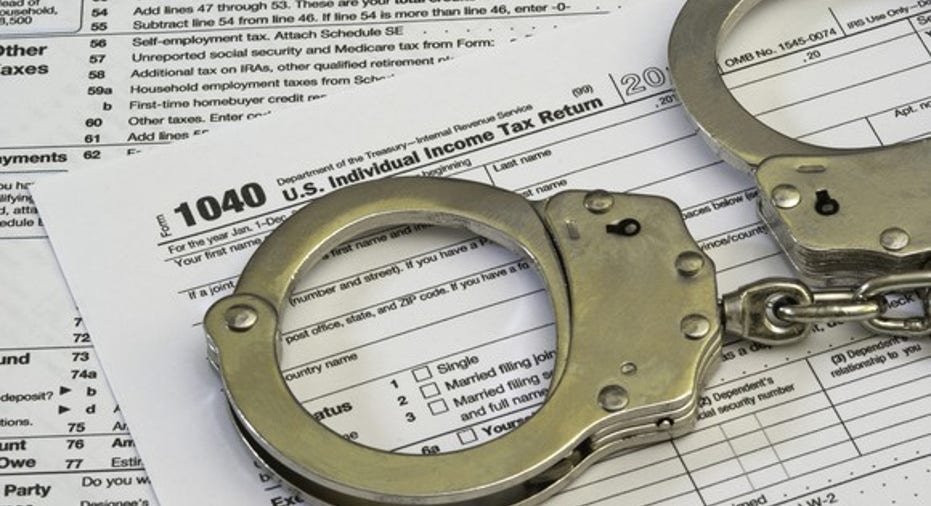Read This Before Doing Your Taxes

With tax season in full swing, countless filers are in the process of gathering documents, combing through receipts, and attempting to scrounge up as many deductions as they're eligible for. The truth is, we all want to find ways to lower our taxes and keep more of our money for ourselves. But some people have a tendency to stretch the truth when it comes to taxes -- like your neighbor who takes a home-office deduction for setting up shop in his kids' playroom, or that coworker who runs a side business and doesn't report the income he receives in cash.
Tempting as it may be to bend the rules on your tax return, doing so will, at the very least, put you at higher risk for an audit. And if you're found to have willingly defrauded the IRS, the consequences could be severe. So before you do your taxes this year, here's one simple rule you need to follow: Don't cheat.
IMAGE SOURCE: GETTY IMAGES.
Keep those deductions legit
There's nothing wrong with taking a series of valid tax deductions. If, for example, you're employed as a freelance writer and purchase an $800 laptop to do your work, there's nothing wrong with taking that deduction provided you still have your receipt. But if you take a family trip to Florida and try claiming it as a business expense when, in reality, you conducted no business while you were away, that poses more of a problem.
Although fewer than 1% of tax returns get audited each year, claiming illegitimate deductions is a good way to get yours on the list. And don't make the mistake of thinking your return won't be flagged just because you don't make a lot of money. While it's true that higher earners, as well as those who report no income, are statistically the most likely to get audited, being too liberal with your deductions could land you in the very same boat.
Report all of your income
Another good way to land on the IRS audit list is to neglect to report all of your income, whether intentionally or not. You know those 1099 forms you get in the mail listing your various sources of income? For each one you receive, the IRS gets a copy as well, so if you think you can tuck those away in your filing cabinet and conveniently forget to include them on your tax return, try again. If you don't report income that the IRS has on file, you can pretty much count on further scrutiny.
Of course, some people fail to report income as the result of an honest mistake. Say you accidentally tossed out a 1099 listing $40 in interest income, or forgot about it because the amount is fairly insignificant. It's a problem, but hardly an egregious error. But if you neglect to report the $10,000 you earned from a given client, that's a far more blatant misstep. And if the IRS finds that you've intentionally attempted to evade income taxes, you could face criminal charges -- even if you're not a particularly high earner.
In fact, of the 17% of taxpayers who break the law when filing their returns, the majority are middle-income earners. Not shockingly, the most popular form of deceit is underreporting income, following by overclaiming deductions.
What penalty might you face for lying on your taxes? It'll depend on whether your mistake is considered willful or accidental. An honest mistake, like forgetting to report a minor interest or dividend payment, could result in a 20% underpayment penalty -- which, if you're talking about a truly small amount, is hardly a big deal. But if you're found guilty of all-out tax fraud, you could face a 75% civil penalty on the amount you owe, not to mention jail time.
As you prepare to file your taxes this year, remember that when it comes to the IRS, honesty really is the best policy. Sure, we all want to save money on taxes, but if you fail to report income or play it too fast and loose with deductions, the consequences could be dire. And that's just not a risk worth taking.
The $16,122 Social Security bonus most retirees completely overlook If you're like most Americans, you're a few years (or more) behind on your retirement savings. But a handful of little-known "Social Security secrets" could help ensure a boost in your retirement income. For example: one easy trick could pay you as much as $16,122 more... each year! Once you learn how to maximize your Social Security benefits, we think you could retire confidently with the peace of mind we're all after.Simply click here to discover how to learn more about these strategies.
The Motley Fool has a disclosure policy.



















